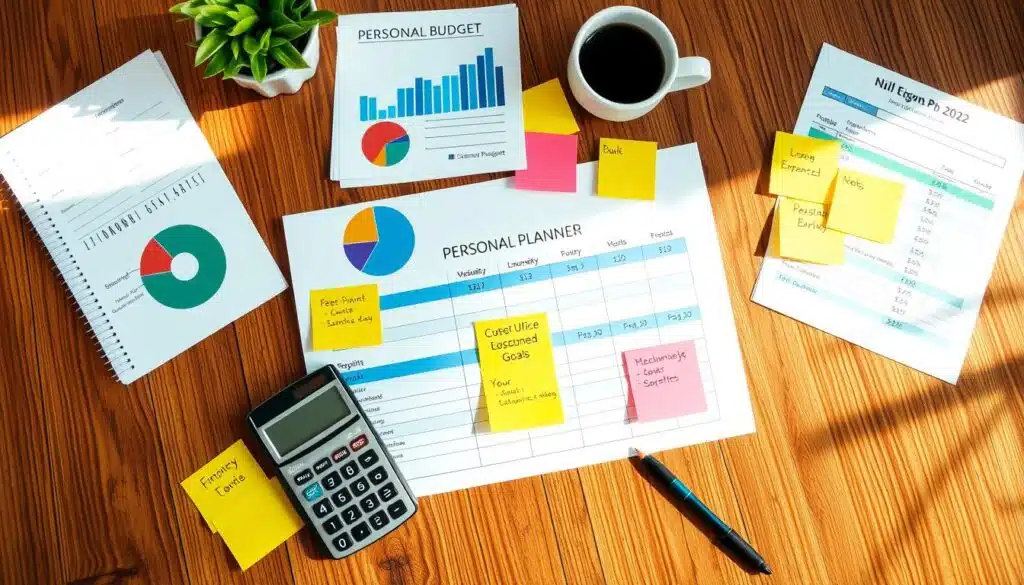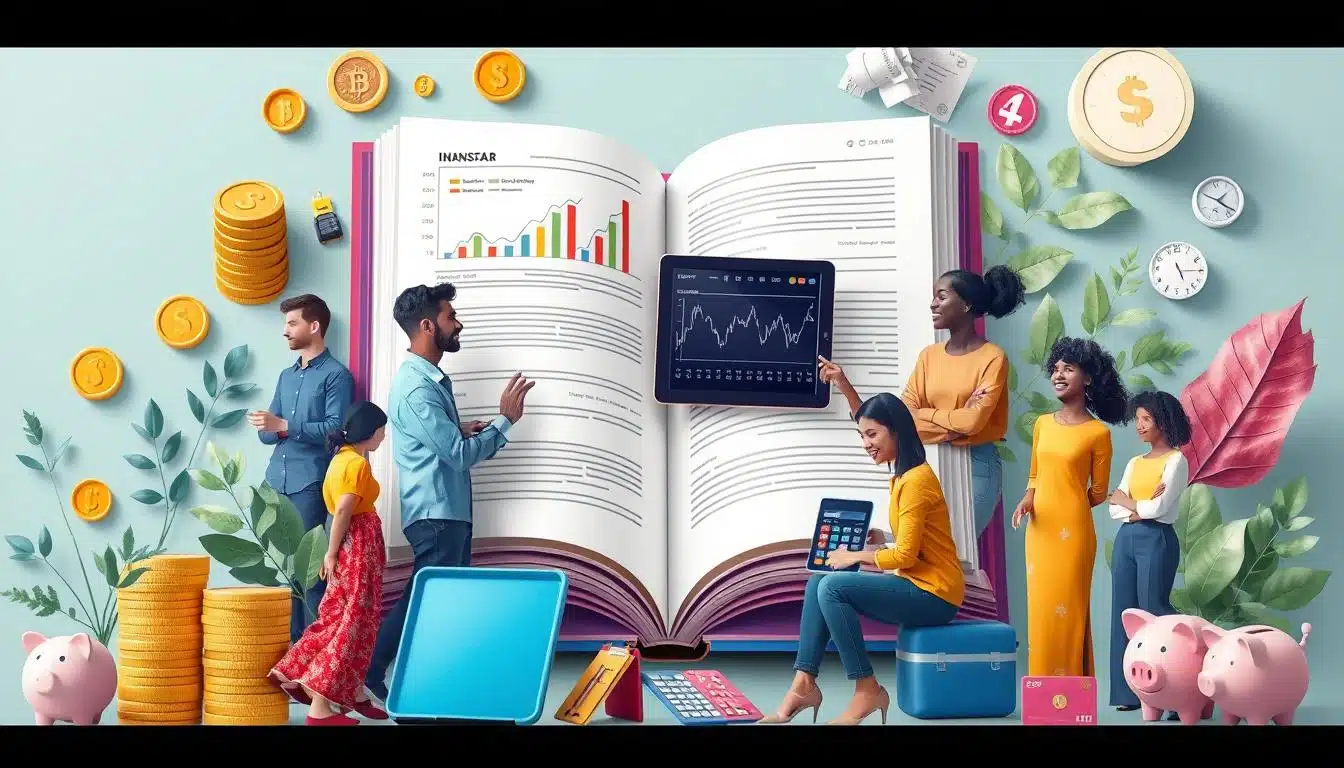Financial literacy means knowing how to handle money well. It includes managing your budget, investing, and understanding key money concepts. Knowing these basics helps you make smart money choices and secure your financial future.
To get better at managing money, start by learning to budget and track your spending. Paying off debt and planning for retirement are also important steps. Financial literacy also means knowing how to spot and avoid bad money practices.
Key Takeaways
- Financial literacy is about understanding and managing your money well.
- Learning these skills can prevent bad money choices and lead to financial stability.
- Important parts of financial literacy are budgeting, managing credit, saving, borrowing, and investing.
- In today’s world, knowing how to handle money is key. It helps you make smart choices and get ready for money challenges ahead.
- For better financial education, check out government sites and consumer advice groups.
Understanding Financial Literacy
Financial literacy is key in today’s world. The Financial Industry Regulatory Authority (FINRA) found that those who know more about money tend to manage it better. They spend less, save more, and plan for retirement.
With longer lives and more complex money matters, knowing about money is more important than ever.
What Financial Literacy Means
Financial literacy means knowing how to handle your money. It includes understanding banking, budgeting, and saving. It also means knowing about debt, credit, and investing.
People who are financially literate can make smart money choices. They avoid debt and plan for a secure future.
Why Financial Literacy Matters Today
In today’s world, financial literacy skills are crucial. We face many financial choices, from mortgages to credit cards. Knowing about money helps us make good decisions.
This knowledge helps us manage our finances well. It leads to a secure financial future.
Core Components of Financial Knowledge
- Banking basics, including checking and savings accounts
- Budgeting and tracking income and expenses
- Debt management, including credit cards and loans
- Understanding credit scores and building credit history
- Saving and investing for short-term and long-term goals
- Risk management, such as insurance and emergency funds
Learning these financial literacy skills helps us make smart choices. It leads to long-term financial well-being.
“Financial literacy is the ability to understand how money works in the world – how someone manages to earn or make it, how that person manages it, how he/she invests it (turns it into more) and how that person donates it to help others.” – Anonymous
Essential Banking and Money Management Skills

Learning about banking and money management is key to being financially literate. These skills help you manage your money well and reach financial goals.
Understanding Bank Accounts
It’s important to know about different bank accounts like savings and checking. Learning how to use these accounts and online banking helps you manage your money better.
Distinguishing Between Financial Institutions
Knowing the difference between retail banks, credit unions, and online banks is crucial. Each has its own benefits. This knowledge helps you choose the right bank for you.
Building an Emergency Fund
Having an emergency fund is essential. Aim to save enough to cover three to six months of living expenses. This fund acts as a safety net for unexpected costs or job loss.
Prioritizing Needs over Wants
It’s important to know the difference between needs and wants. Budgeting and saving for the future helps you reach your financial goals and stay stable.
Accessing and Managing Account Information
Knowing how to check your account info online or through apps is empowering. Regularly reviewing your accounts helps catch errors and spot issues early.
| Banking and Money Management Skills | Benefits |
|---|---|
| Understanding different types of bank accounts | Enables effective money management and account utilization |
| Knowing how to open and manage bank accounts | Promotes financial control and organization |
| Utilizing online banking services | Facilitates convenient and secure access to financial information |
| Differentiating between financial institutions | Allows individuals to choose the right institution for their needs |
| Building an emergency fund | Provides a financial safety net during unexpected events |
| Prioritizing needs over wants | Encourages responsible spending and saving habits |
| Accessing and managing account information | Promotes financial awareness and informed decision-making |
Mastering these essential skills sets the stage for a financially stable future.
Creating and Managing a Personal Budget

Learning about financial planning and budgeting is key for better financial health. Making a personal budget means knowing your financial goals, keeping track of income and expenses, and spending wisely. By managing your finances well, you can make smart financial decisions and reach your financial planning goals.
Tracking Income and Expenses
The first step is to list your income and expenses. You need to record all your income, like your salary, side jobs, or investments. Then, track your expenses, dividing them into fixed costs (like rent) and variable ones (like food and fun).
Setting Financial Goals
After knowing your income and expenses, set financial goals. Goals can be short-term, like saving for emergencies, or long-term, like retirement or a home. Having clear, achievable goals will help you stay on track to improve your financial life.
Smart Spending Strategies
With your financial goals in mind, start spending smarter. Focus on what’s really important, cut costs on things you need, and know the difference between wants and needs. Using budgeting apps can make it easier to stick to your plan.
“Budgeting ensures having more money coming in than going out to cover essential costs, afford important items, and plan for short- and long-term goals.”
Credit Management and Building Credit History

Learning about financial literacy is key to managing credit well. It’s especially important for young adults. They need to know about credit cards, interest rates, and how to use credit wisely.
Every dollar spent on a credit card must be paid back. Interest builds up every day on unpaid balances. This can make monthly bills much higher.
To build good credit, use credit wisely, pay bills on time, and keep a low credit utilization ratio. Knowing about credit scores and how they affect your future is vital. Good credit can mean better loan terms, lower insurance rates, and more financial freedom later on.
Financial institutions and consumer financial products are crucial in credit management. Understanding the value of financial protection and building a solid credit history is essential. This way, individuals can achieve long-term financial success and access many financial products and services.
Also Read : Mastering Financial Derivatives: Strategies For Trading And Investment
FAQs
Q: Why is financial literacy important?
A: Financial literacy is important because it equips individuals with the knowledge and skills necessary to make informed decisions about their personal financial management, ultimately leading to a more secure financial future.
Q: How can I improve my financial literacy skills?
A: You can improve your financial literacy skills by accessing various financial literacy resources such as online courses, workshops, and financial education programs offered by organizations like the Jump$tart Coalition for personal financial literacy.
Q: What are the principles of financial literacy?
A: The principles of financial literacy include understanding budgeting, saving, investing, managing debt, and using financial services wisely to enhance your financial capability and overall financial wellness.
Q: How does financial literacy education benefit high school students?
A: Financial literacy education for high school students prepares them for real-world financial challenges, ensuring they are equipped with the necessary skills to manage their finances, apply for financial aid, and make sound decisions about their financial future.
Q: What role does financial planning play in financial literacy?
A: Financial planning is a crucial aspect of financial literacy as it involves setting financial goals, creating budgets, and developing strategies for saving and investing to achieve those goals, thereby reducing financial stress.
Q: What resources are available for financial literacy and education?
A: There are numerous resources available for financial literacy and education, including Everfi’s free high school financial literacy program, online courses, books, and workshops provided by community organizations and financial advisors.
Q: Can financial literacy help reduce financial stress?
A: Yes, financial literacy can help reduce financial stress by providing individuals with the knowledge and skills necessary to manage their finances effectively, make informed decisions, and avoid debt-related issues.
Q: What is the importance of financial literacy for adults?
A: The importance of financial literacy for adults lies in its ability to promote informed decision-making regarding investments, retirement planning, and effective debt management, leading to improved personal financial management and stability.
Q: How can financial literacy impact my financial future?
A: Financial literacy can significantly impact your financial future by empowering you to make sound financial decisions, build wealth, and achieve long-term financial goals through informed financial management practices.
Q: What is the national financial literacy strategy?
A: The national financial literacy strategy refers to a comprehensive plan developed by the financial literacy and education commission and other governmental bodies to improve financial literacy across the population, focusing on education, resources, and initiatives that promote better financial practices.





